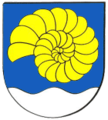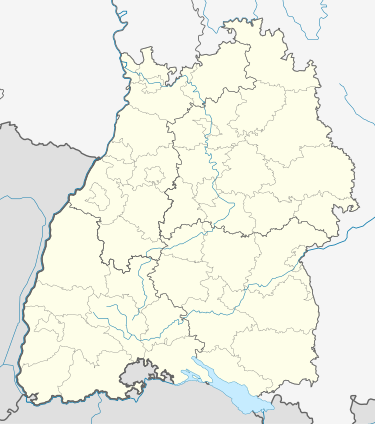You can help expand this article with text translated from the corresponding article in German. (February 2009) Click [show] for important translation instructions.
|
Hülben is a municipality in the district of Reutlingen in Baden-Württemberg in Germany.
Hülben | |
|---|---|
Location of Hülben within Reutlingen district  | |
| Coordinates: 48°31′06″N 09°24′20″E / 48.51833°N 9.40556°E | |
| Country | Germany |
| State | Baden-Württemberg |
| Admin. region | Tübingen |
| District | Reutlingen |
| Government | |
| • Mayor (2022–30) | Siegmund Ganser[1] |
| Area | |
| • Total | 6.40 km2 (2.47 sq mi) |
| Elevation | 713 m (2,339 ft) |
| Population (2022-12-31)[2] | |
| • Total | 3,078 |
| • Density | 480/km2 (1,200/sq mi) |
| Time zone | UTC+01:00 (CET) |
| • Summer (DST) | UTC+02:00 (CEST) |
| Postal codes | 72584 |
| Dialling codes | 07125 |
| Vehicle registration | RT |
| Website | www.huelben.de |
It is located next to the area of the Celtic Heidengraben.
Geography
editHülben is a municipality on the northern edge of the Swabian Jura, above the spa town of Bad Urach.
Neighbouring communities
editThe following cities and municipalities are bordering the municipality Hülben, they are (starting from the north) called the clockwise and belong to Reutlingen district or to Esslingen district 1
Neuffen 1, Erkenbrechtsweiler 1, Grabenstetten, Bad Urach and Dettingen an der Erms.
Constituent communities
editThe municipality Hülben includes the village Hülben and a group of houses.[3]
History
editEstablishing and territorial affiliation
editHülben was probably founded in the time of the Alemannic conquest between 700 and 800. The village name is a dwelling place name by the two Hülben , where at that time had settled the first settlers. 1137 Hülben is first mentioned in the Zwiefalter chronicles. 1265 came Hülben as part of the House of Urach to Württemberg, and became Protestant 1534 after the Battle of Lauffen.
Only in 1866 Hülben had his own parish.
Pietism
editNationally the community became known by the derived from Michael Cullin (* 1540) family of teachers named Kullen. From 1722 to 1966 (until 1939 without interruption) members of the family Kullen worked in the school service of Hülben. From the family Kullen came also the old pietism community, which holds the "fair Monday hour" till today.
Population
editThe population figures are census results (1) or official updates of the State Statistical Office (only principal residences).
|
Coat of arms
editPolitics
editCouncil
editThe council Hülben has 12 members. The local elections in Baden-Württemberg 2014 were made in Hülben according to the majority vote, this means that only one list was drawn up. The council consists of the elected honorary councilors and the mayor as chairman. The mayor is entitled to vote in the municipal council.
Mayor
edit- 1922-1951: Ernst Schaude
- 1952-1982: Fritz Herter
- 1982-2006: Hans Notter
- Since 2006: Siegmund Ganser
Arms
editBlazon: "In blue over a silver Wellenschildfuß a golden ammonite."
Old coat of arms
editThe old coat of arms was awarded on 26 April 1951 by Ministry of the Interior Württemberg-Hohenzollern.
Blazon: "In silver over a black Wellenschildfuß a black bar."
After a council resolution of 12 March 1948, the emblem of the already then no longer predominantly agricultural municipality should include other figures. The Wellenschildfuß refers to the municipality of origin, which is derived from "hülwe" = pool or lake. The bar is reminiscent of the Knights of Dettingen who had possessions in Hülben. The family of Cudi miles de Tettingen led this crest figure.[4]
Natural Monuments
editThe Hülben stalactite cave was discovered during the construction of national road Bad Urach-Hülben on September 19, 1978, it is a stalactite cave with stalactites and stalagmites. An about 5 m deep shaft leads into the easily accessible part of the cave. This has about room size, but with only partial low altitude.[5]
Regular events
edit- Hüle-Hock, end August
- Kirchweih Monday hour on Monday after the 3rd Sunday of October
- Feuerwehr Hock, in mid-June
- May Hock, May 1
Arts
editModern art (glasses) outside Hülben
Economy and infrastructure
editTraffic
editThe National Road 250 connects the municipality to the south with Bad Urach. The state road 1250 connects Hülben to the north with Neuffen.
The Public transport is guaranteed by the Verkehrsverbund Neckar-Alb-Donau (NALDO). The community is located in the comb 221.
Personality
editSons and daughters of the town
edit- Hans Schwenkel (1886-1957), Württemberg State Curator of Nature Conservation during Nazi era
- Gotthilf Kächele (1888-1969), baker champion and politician
- Eberhard Kullen (1911-2007), Federal Railroad official, head of old pietism community Hülben
Personalities who have worked at the site
edit- Ernst Schaude (1916-2001), jurist, Government Vice-President of the Regierungspräsidium Stuttgart, grew up in Hülben
- Markus Pleuler (born 1970), football player, comes from Hülben
Famous pastors
edit- Johann Ludwig Fricker (1729-1766), pastor in Hülben
- Wilhelm Zimmermann (1807-1878), pastor in Hülben, professor of German literature and history, a deputy in the Frankfurt National Assembly, Member of Parliament
In Hülben active painters
edit- Karl Wilhelm Bauerle (1831-1912), a painter at the court of Queen Victoria
Literature
edit- Hülben. Hrsg.: Gemeinde Hülben. Neuffen, Hülben [1995]. – Mit Abbildungen
- Hülben. Ein Gang durch die Geschichte. Herausgeber: Gemeinde Hülben. Redaktion: Kreisarchivarin Irmtraud Betz. Hülben 1987. – Mit Abbildungen
Pietismus
- Dr. Wilhelm Busch: Aus einem schwäbischen Dorfschulhause (Familie Kullen). 2. Aufl. Elberfeld 1906
- Friedrich Baun: Die Familie Kullen. Zweihundert Jahre im Dienst der Schule zu Hülben (1722–1922). Stuttgart 1922
- Julius Roessle [Rößle]: Von Bengel bis Blumhardt. Gestalten und Bilder aus der Geschichte des schwäbischen Pietismus. 4. Auflage. Metzingen/Württ. 1966, Seite 324–332: "Hülben und die Familie Kullen"
- Gelebter Glaube. Erfahrungen und Lebenszeugnisse aus unserem Land. Ein Lesebuch. Herausgegeben von Werner Raupp. Metzingen/Württemberg 1991, S. 179–188: "Familie Kullen"
- Rolf Scheffbuch: Das Kullen-Schulhaus in Hülben. Hrsg. [und Verleger]: Siegfried Kullen, Hülben, [Hauptstr. 18], 2011, ISBN 978-3-00-036752-6. [Erschienen anlässlich des 200-Jahr-Jubiläums der Erbauung.]
References
edit- ^ Bürgermeisterwahl Hülben 2022, Staatsanzeiger.
- ^ "Bevölkerung nach Nationalität und Geschlecht am 31. Dezember 2022" [Population by nationality and sex as of December 31, 2022] (CSV) (in German). Statistisches Landesamt Baden-Württemberg. June 2023.
- ^ The state of Baden-Württemberg. Official description after circles and municipalities. Volume VII: Tübingen. Kohlhammer, Stuttgart 1978, ISBN 3-17-004807-4, pp 27-99
- ^ Die Kreis- und Gemeindewappen im Regierungsbezirk Tübingen Volume 4 Tübingen page 66 ISBN 3-8062-0804-2 Published by the National Archives Directorate Baden-Württemberg 1987
- ^ Uwe Eisner, Klaus Baldzer: The Hülbener cave. In: Bulletin of Höhlenforschungsgruppe Nürtingen. No. 12
External links
edit


